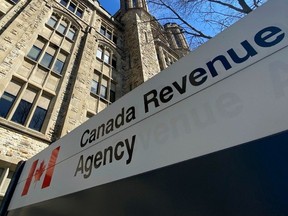World
Calgarian Fined $1,000 for Paper Tax Filing of Inactive Company

Calgary resident Christopher Buckley received an unexpected $1,000 fine from the Canada Revenue Agency (CRA) for submitting a paper tax filing for his inactive film production company. Buckley had filed similar returns by paper for years without issue, so he was taken aback when he learned that a recent legislative change now penalizes such filings.
In 2023, the Budget Implementation Act enacted by the Liberal government removed the previous threshold requiring only companies with revenues of $1 million or more to file electronically. As a result, many companies, including those that are inactive, are now required to submit their tax returns electronically or face a penalty of $1,000, effective from the 2024 tax year. Prior to this change, only a limited number of exceptions applied, which did not include dormant corporations like Buckley’s.
Buckley’s situation reflects a broader issue affecting 11,640 companies, including nearly 5,000 inactive companies, that were fined by the CRA for filing paper returns last year. These figures were revealed in data published in response to a question from Conservative MP Greg McLean.
Buckley expressed frustration over the fine, highlighting the simplicity of his paper filing. “It cost me $2 to print off three pieces of paper,” he stated. He criticized the penalty, saying, “They’re going to charge me $1,000 for doing that… or $333.33 per page.” He has since lodged an objection with the CRA.
MP McLean voiced concerns over the CRA’s enforcement of the new rules, describing the fines as overly aggressive. “The CRA is acting here I think with a little too much aggression,” he commented, suggesting that exceptions should be made for cases like Buckley’s. McLean emphasized the need for a more supportive approach from government agencies, particularly for individuals facing technological barriers.
In response to the fines, Sylvie Branch, a spokesperson for the CRA, stated that the agency has no discretion in applying the $1,000 penalty. “The legislation does not provide for exceptions related to inactive corporations or those with no revenues, expenses, or taxes to pay,” she explained. Branch added that while the penalty is mandatory, taxpayers can appeal for relief in specific circumstances, such as financial hardship or other significant obstacles.
The legislative shift aims to significantly reduce the number of corporations filing tax returns on paper. Data from the CRA indicates that the number of corporate tax returns submitted on paper has declined dramatically, from 235,820 in 2015 to 115,080 in 2023 for companies under $1 million in revenue. Following the change, corporate paper filings plummeted further to just under 60,000.
The CRA encourages taxpayers who believe they should not be penalized to apply for relief. The agency maintains that it can cancel or waive penalties under certain conditions, particularly when taxpayers face extraordinary circumstances outside their control.
As the situation unfolds, Buckley and others affected by this policy change continue to seek clarity and fairness in the CRA’s enforcement of new tax regulations.
-

 World4 months ago
World4 months agoScientists Unearth Ancient Antarctic Ice to Unlock Climate Secrets
-

 Entertainment4 months ago
Entertainment4 months agoTrump and McCormick to Announce $70 Billion Energy Investments
-

 Lifestyle4 months ago
Lifestyle4 months agoTransLink Launches Food Truck Program to Boost Revenue in Vancouver
-

 Science4 months ago
Science4 months agoFour Astronauts Return to Earth After International Space Station Mission
-

 Technology2 months ago
Technology2 months agoApple Notes Enhances Functionality with Markdown Support in macOS 26
-

 Top Stories3 weeks ago
Top Stories3 weeks agoUrgent Update: Fatal Crash on Highway 99 Claims Life of Pitt Meadows Man
-

 Sports4 months ago
Sports4 months agoSearch Underway for Missing Hunter Amid Hokkaido Bear Emergency
-

 Politics3 months ago
Politics3 months agoUkrainian Tennis Star Elina Svitolina Faces Death Threats Online
-

 Politics4 months ago
Politics4 months agoCarney Engages First Nations Leaders at Development Law Summit
-

 Technology4 months ago
Technology4 months agoFrosthaven Launches Early Access on July 31, 2025
-

 Top Stories2 weeks ago
Top Stories2 weeks agoFamily Remembers Beverley Rowbotham 25 Years After Murder
-

 Top Stories6 days ago
Top Stories6 days agoBlake Snell’s Frustration Ignites Toronto Blue Jays Fan Fury





















